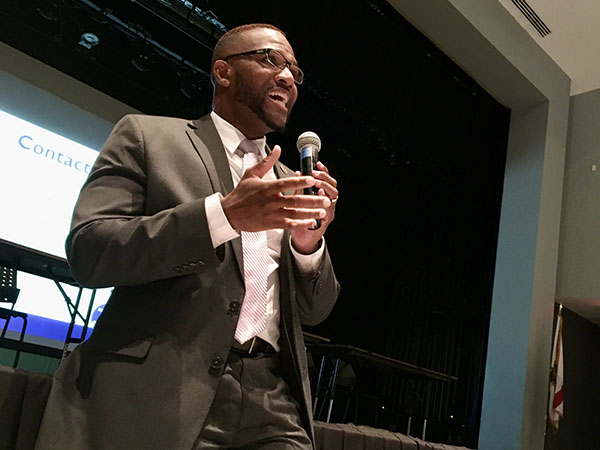
Curious and concerned parents attended a town hall forum held at the Wellington High School theater on Monday, Dec. 2 hosted by the Palm Beach County State Attorney’s Office and the Palm Beach County School District’s Department of Safe Schools.
The forum covered an array of issues students are facing in schools today, such as vaping, sexting, cyberbullying and mental health struggles.
With more than 50 people in attendance, it was the fourth and largest turnout of four town hall meetings, the others taking place in September, October and November at schools in other Palm Beach County geographic regions.
A continuous theme throughout the night was the urging of experts for parents to be actively aware and involved in their children’s physical and online lives.
Cheo Reid, the State Attorney’s Office chief of the Juvenile Division, addressed the crowd early on in the night, educating parents on some of the cyber action in which their children could be engaged, specifically centering on social media and video games.
Reid explained to the parents that video games have chat features, and students can fall prey to ill-meaning strangers they meet through these gaming applications.
“We need to understand the dynamics of ,” Reid said. “We also need to be able to interpret the messages that are being sent back and forth.”
Reid told the audience that today’s teens have their own language, and while this is not a foreign concept, parents need to be able to interpret that language.
Ruthe Francis, manager of the Department of Safe Schools, briefed the parents on a few of the acronyms that could make up their children’s “secret language.” For example, “PIR” is an acronym for “Parent in Room.” Others noted by Francis included, “P911” (“Parent Alert”), “KPC” (“Keeping Parent Clueless”), “LMIRL” (“Let’s Meet in Real Life”) and the ever-disturbing “GNOC” (“Get Naked on Camera”).
These are only a few of the acronyms Francis noted, and she encouraged parents to be alert and in the know when it comes to their children’s forms of communication.
“If you don’t know what it means, look it up, or ask them,” Francis said. “And if you’re uncomfortable with the answer, Google it.”
In terms of “GNOC,” Reid explained that sexually explicit pictures or videos on a student’s phone or computer involving a person under the age of 18 are considered child pornography, and each picture or video qualifies the holder for up to five years in prison as an adult. So, if the student has two pictures, that could lead to 10 years in prison.
Reid also noted that whether or not the student is legally an adult, possessing child pornography can be a ticket to the state’s sex offender registry.
Written threats posted on social media or sent through message apps, Reid explained, are also grounds for imprisonment. In the State of Florida, these written threats, whether the student meant it or not, are punishable to up to 15 years in prison, per message or per post, he said.
Reid explained to the attendees that social media and gaming industries track and report posts and messages considered potentially harmful. Reid also emphasized that messages are never truly deleted.
Moving from online issues to health issues, several speakers said that vaping has also become an enormous problem among teenagers. Vaping devices are made to look like computer flash drives, car keys, working pens and lipstick, among other everyday items. If an underaged student is caught with such a device, he or she could also face a year in jail, and up to five years in prison if it contains THC oil, the active ingredient in marijuana.
“Many of them are not thinking about their futures,” Reid said, “and not thinking about the consequences that are associated with this behavior.”
Cyberbullying was also on the agenda. Jean Francis, the State Attorney’s Office deputy chief of the Juvenile Division, said his office has seen that students are creating fake social media accounts and cyber attacking other youth.
Punishment for this, according to Francis, ranges from one year in jail to five years in prison.
“On top of it possibly being a crime, you never know what somebody is going through,” Francis said, emphasizing that cyberbullying can have extreme, negative effects on the victim’s mental health.
Monica Sanchez, a mental health professional with the Palm Beach County School District, said cyberbullying isn’t the only aspect that can affect a student’s mental health. Any major change in a parent’s life — such as a death in the family or career change or move — can affect his or her mental health, as well as the mental health of the student.
“When you are experiencing things, they vicariously experience things,” Sanchez explained. “They experience what you experience, and then they experience their own feelings and reactions to the event.”
Sanchez explained that while this is typical, children can have atypical reactions, and parents need to be aware.
“It is very, very rare that an adolescent will come to you and say clearly, ‘I’m feeling very depressed, and I’m starting to self-injure,’” Sanchez said. “We have to notice and pay attention to see if our kids are experiencing some type of mental health struggle.”
The speakers pointed out that schools are continuing to implement ways for students and parents to receive help, such as access to anonymous reporting hotlines through their school portal, mental health professionals on campus and more.
“If there’s something that you need assistance with for your child, please don’t hesitate to contact your school administration,” said Dr. JeTawn Shannon, manager of the school district’s Department of Behavioral and Mental Health Services. “They can make sure that they help point you to the right person on their campus who can provide that support.”







